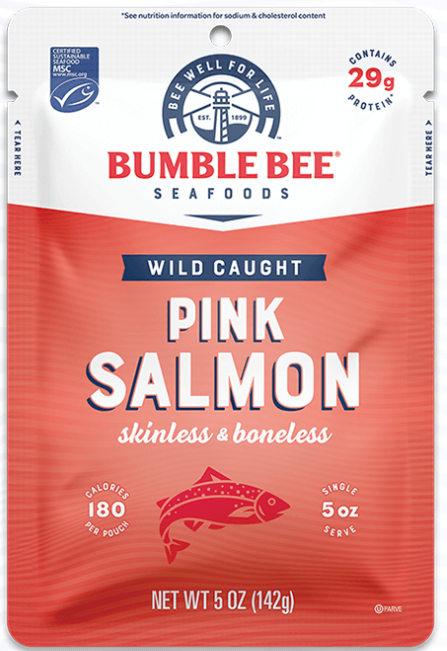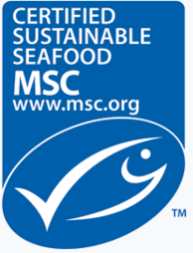Bumble Bee Falsely Advertises Tuna, Salmon Products as ‘Sustainable,’ Class Action Says
Last Updated on September 21, 2023
Nasser et al. v. Bumble Bee Foods, LLC
Filed: March 2, 2023 ◆§ 2:23-cv-01558
A class action alleges Bumble Bee has falsely advertised certain canned or pouched tuna and salmon products as “sustainable,” given that the company’s fishing practices harm ocean ecosystems and marine life.
A proposed class action alleges Bumble Bee has falsely advertised certain canned or pouched tuna and salmon products as “certified sustainable seafood,” given that the company’s fishing practices indiscriminately harm ocean ecosystems and marine life.
Have you bought Bumble Bee salmon or tuna products advertised as sustainable? Let us know here.

The 51-page lawsuit says the Bumble Bee products at issue, including its canned or pouched Wild Caught Pink Salmon and Sockeye Salmon, canned or pouched Wild Selections Solid White Albacore Tuna, and pouched Wild Caught Applewood Smoke Tuna and Wild Selections Pink Salmon, are stamped with the Marine Stewardship Council (MSC) “blue tick” certification, which promises consumers that the products are sourced from sustainable fishing practices.
Despite representing its products as “sustainable,” Bumble Bee uses environmentally destructive, large-scale fishing methods that harm fish populations and catch, injure or kill excessive amounts of marine life, such as dolphins, whales, seals, seabirds, sea turtles and sharks, the case alleges. The complaint also accuses Bumble Bee of perpetrating “egregious” forced labor abuses, often against indebted migrant workers who spend long periods at sea supplying the company tuna.
“By failing to disclose that its Products are, sadly, unsustainably sourced through the use of fishing methods that harm ocean habitats and marine life, Bumble Bee has induced reasonable consumers, like Plaintiffs and Class Members, to become unwitting participants in the very environmental crisis they attempt to avoid by purchasing and paying a premium for Bumble Bee’s Products,” the suit stresses, adding that consumers would not have bought the products, or would have paid less for them, had they known Bumble Bee’s sustainability promises were false.
Want to stay in the loop on class actions that matter to you? Sign up for ClassAction.org’s free weekly newsletter here.

Although the MSC claims to use its blue tick ecolabel to reward sustainable fishing practices, the filing contends that, in truth, the organization’s “hollow” certification is handed out to fisheries that blatantly violate its own environmental, chain of custody and labor standards. According to the case, experts worry the organization’s certification process is riddled with conflicts of interest, as fisheries pay MSC anywhere from $20,000 to $100,000 to use its ecolabel on their seafood products, and licensing revenue makes up about 80 percent of the organization’s profits.
Moreover, the International Seafood Sustainability Foundation (ISSF), a global coalition purportedly committed to ocean conservation that helps fisheries meet the MSC’s certification requirements, is controlled and funded by tuna industry giants, including Bumble Bee, the filing says.
The complaint contends that, as a result, MSC-certified fisheries like Bumble Bee fail to provide promised protections for the oceans, marine life and humans and instead engage in “environmentally destructive, irresponsible, and inhumane” practices, such as:
“ … the suffocation and crushing of dolphins caught in fishing nets that are then hauled onto fishing boats while severely injured or dead; the torturously slow death of endangered sea turtles after getting caught on large hooks meant for tuna; the trapping of whales by fishing gear causing deep wounds and intense suffering; and the extortion of migrants working on fishing boats, who are forced to labor relentlessly for long hours, with little food and minimal sleep, under the threat of being beaten or thrown overboard.”
Per the lawsuit, Bumble Bee’s fishing techniques involve large nets known as purse seiners and gillnets, which indiscriminately capture and crush bycatch, i.e., non-target species, like juvenile fish, sharks, seabirds, sea turtles, whales, dolphins and porpoises. The filing adds that Bumble Bee captures tuna using longlines, miles-long fishing lines with thousands of hooks that catch and mortally wound bycatch. Moreover, Bumble Bee’s unsustainable fishing techniques have contributed to the overfishing of sockeye and pink salmon, economically devastating tribal fisheries on the West Coast, the filing relays.
The case further charges that in 2020, Bumble Bee was acquired by FCF Co. Ltd. (FCF), a Taiwan-based seafood producer linked to widespread labor abuses. Alarmingly, a 2022 investigation by Greenpeace found that migrant fishers working on Taiwanese fishing vessels supplying tuna to Bumble Bee from 2019 to 2021 were subjected to forced labor abuses such as “withholding of wages, confiscation and retention of passports, food restrictions, and excessive overtime, at times only being allowed three hours of sleep in a day,” the case relays.
“Consumers expected that Bumble Bee would have the proper, company-wide monitoring in place to confirm the explicit promise it made to consumers regarding the sustainability of the fishing practices used to source the Products,” the complaint reads. “Instead, Bumble Bee failed to ensure that the fisheries only sourced using sustainable means, making its promises meaningless.”
The lawsuit seeks to represent anyone who purchased the Bumble Bee’s line of “sustainable” seafood products in the United States and its territories during the applicable statute of limitations period.
Have you bought Bumble Bee salmon or tuna products advertised as sustainable? Let us know here.
Video Game Addiction Lawsuits
If your child suffers from video game addiction — including Fortnite addiction or Roblox addiction — you may be able to take legal action. Gamers 18 to 22 may also qualify.
Learn more:Video Game Addiction Lawsuit
Depo-Provera Lawsuits
Anyone who received Depo-Provera or Depo-Provera SubQ injections and has been diagnosed with meningioma, a type of brain tumor, may be able to take legal action.
Read more: Depo-Provera Lawsuit
How Do I Join a Class Action Lawsuit?
Did you know there's usually nothing you need to do to join, sign up for, or add your name to new class action lawsuits when they're initially filed?
Read more here: How Do I Join a Class Action Lawsuit?
Stay Current
Sign Up For
Our Newsletter
New cases and investigations, settlement deadlines, and news straight to your inbox.
Before commenting, please review our comment policy.